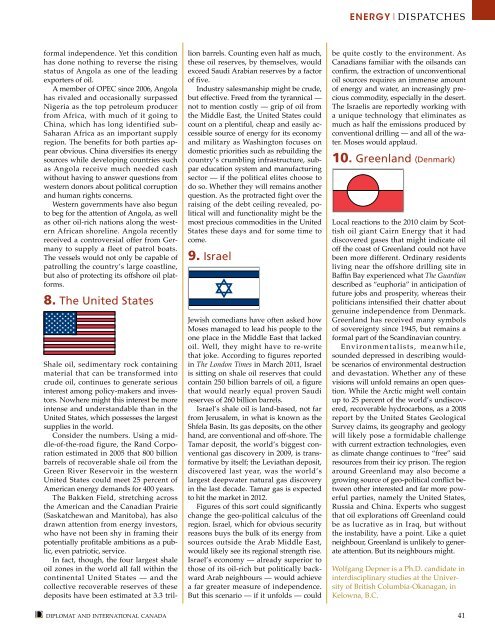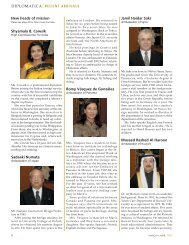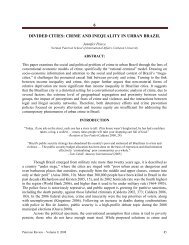the new petro power paradigm - Diplomat Magazine
the new petro power paradigm - Diplomat Magazine
the new petro power paradigm - Diplomat Magazine
Create successful ePaper yourself
Turn your PDF publications into a flip-book with our unique Google optimized e-Paper software.
ENERGY|Di spatches<br />
formal independence. Yet this condition<br />
has done nothing to reverse <strong>the</strong> rising<br />
status of Angola as one of <strong>the</strong> leading<br />
exporters of oil.<br />
A member of OPEC since 2006, Angola<br />
has rivaled and occasionally surpassed<br />
Nigeria as <strong>the</strong> top <strong>petro</strong>leum producer<br />
from Africa, with much of it going to<br />
China, which has long identified sub-<br />
Saharan Africa as an important supply<br />
region. The benefits for both parties appear<br />
obvious. China diversifies its energy<br />
sources while developing countries such<br />
as Angola receive much needed cash<br />
without having to answer questions from<br />
western donors about political corruption<br />
and human rights concerns.<br />
Western governments have also begun<br />
to beg for <strong>the</strong> attention of Angola, as well<br />
as o<strong>the</strong>r oil-rich nations along <strong>the</strong> western<br />
African shoreline. Angola recently<br />
received a controversial offer from Germany<br />
to supply a fleet of patrol boats.<br />
The vessels would not only be capable of<br />
patrolling <strong>the</strong> country’s large coastline,<br />
but also of protecting its offshore oil platforms.<br />
8. The United States<br />
Shale oil, sedimentary rock containing<br />
material that can be transformed into<br />
crude oil, continues to generate serious<br />
interest among policy-makers and investors.<br />
Nowhere might this interest be more<br />
intense and understandable than in <strong>the</strong><br />
United States, which possesses <strong>the</strong> largest<br />
supplies in <strong>the</strong> world.<br />
Consider <strong>the</strong> numbers. Using a middle-of-<strong>the</strong>-road<br />
figure, <strong>the</strong> Rand Corporation<br />
estimated in 2005 that 800 billion<br />
barrels of recoverable shale oil from <strong>the</strong><br />
Green River Reservoir in <strong>the</strong> western<br />
United States could meet 25 percent of<br />
American energy demands for 400 years.<br />
The Bakken Field, stretching across<br />
<strong>the</strong> American and <strong>the</strong> Canadian Prairie<br />
(Saskatchewan and Manitoba), has also<br />
drawn attention from energy investors,<br />
who have not been shy in framing <strong>the</strong>ir<br />
potentially profitable ambitions as a public,<br />
even patriotic, service.<br />
In fact, though, <strong>the</strong> four largest shale<br />
oil zones in <strong>the</strong> world all fall within <strong>the</strong><br />
continental United States — and <strong>the</strong><br />
collective recoverable reserves of <strong>the</strong>se<br />
deposits have been estimated at 3.3 trillion<br />
barrels. Counting even half as much,<br />
<strong>the</strong>se oil reserves, by <strong>the</strong>mselves, would<br />
exceed Saudi Arabian reserves by a factor<br />
of five.<br />
Industry salesmanship might be crude,<br />
but effective. Freed from <strong>the</strong> tyrannical —<br />
not to mention costly — grip of oil from<br />
<strong>the</strong> Middle East, <strong>the</strong> United States could<br />
count on a plentiful, cheap and easily accessible<br />
source of energy for its economy<br />
and military as Washington focuses on<br />
domestic priorities such as rebuilding <strong>the</strong><br />
country’s crumbling infrastructure, subpar<br />
education system and manufacturing<br />
sector — if <strong>the</strong> political elites choose to<br />
do so. Whe<strong>the</strong>r <strong>the</strong>y will remains ano<strong>the</strong>r<br />
question. As <strong>the</strong> protracted fight over <strong>the</strong><br />
raising of <strong>the</strong> debt ceiling revealed, political<br />
will and functionality might be <strong>the</strong><br />
most precious commodities in <strong>the</strong> United<br />
States <strong>the</strong>se days and for some time to<br />
come.<br />
9. Israel<br />
Jewish comedians have often asked how<br />
Moses managed to lead his people to <strong>the</strong><br />
one place in <strong>the</strong> Middle East that lacked<br />
oil. Well, <strong>the</strong>y might have to re-write<br />
that joke. According to figures reported<br />
in The London Times in March 2011, Israel<br />
is sitting on shale oil reserves that could<br />
contain 250 billion barrels of oil, a figure<br />
that would nearly equal proven Saudi<br />
reserves of 260 billion barrels.<br />
Israel’s shale oil is land-based, not far<br />
from Jerusalem, in what is known as <strong>the</strong><br />
Shfela Basin. Its gas deposits, on <strong>the</strong> o<strong>the</strong>r<br />
hand, are conventional and off-shore. The<br />
Tamar deposit, <strong>the</strong> world’s biggest conventional<br />
gas discovery in 2009, is transformative<br />
by itself; <strong>the</strong> Leviathan deposit,<br />
discovered last year, was <strong>the</strong> world’s<br />
largest deepwater natural gas discovery<br />
in <strong>the</strong> last decade. Tamar gas is expected<br />
to hit <strong>the</strong> market in 2012.<br />
Figures of this sort could significantly<br />
change <strong>the</strong> geo-political calculus of <strong>the</strong><br />
region. Israel, which for obvious security<br />
reasons buys <strong>the</strong> bulk of its energy from<br />
sources outside <strong>the</strong> Arab Middle East,<br />
would likely see its regional strength rise.<br />
Israel’s economy — already superior to<br />
those of its oil-rich but politically backward<br />
Arab neighbours — would achieve<br />
a far greater measure of independence.<br />
But this scenario — if it unfolds — could<br />
be quite costly to <strong>the</strong> environment. As<br />
Canadians familiar with <strong>the</strong> oilsands can<br />
confirm, <strong>the</strong> extraction of unconventional<br />
oil sources requires an immense amount<br />
of energy and water, an increasingly precious<br />
commodity, especially in <strong>the</strong> desert.<br />
The Israelis are reportedly working with<br />
a unique technology that eliminates as<br />
much as half <strong>the</strong> emissions produced by<br />
conventional drilling — and all of <strong>the</strong> water.<br />
Moses would applaud.<br />
10. Greenland (Denmark)<br />
Local reactions to <strong>the</strong> 2010 claim by Scottish<br />
oil giant Cairn Energy that it had<br />
discovered gases that might indicate oil<br />
off <strong>the</strong> coast of Greenland could not have<br />
been more different. Ordinary residents<br />
living near <strong>the</strong> offshore drilling site in<br />
Baffin Bay experienced what The Guardian<br />
described as “euphoria” in anticipation of<br />
future jobs and prosperity, whereas <strong>the</strong>ir<br />
politicians intensified <strong>the</strong>ir chatter about<br />
genuine independence from Denmark.<br />
Greenland has received many symbols<br />
of sovereignty since 1945, but remains a<br />
formal part of <strong>the</strong> Scandinavian country.<br />
Environmentalists, meanwhile,<br />
sounded depressed in describing wouldbe<br />
scenarios of environmental destruction<br />
and devastation. Whe<strong>the</strong>r any of <strong>the</strong>se<br />
visions will unfold remains an open question.<br />
While <strong>the</strong> Arctic might well contain<br />
up to 25 percent of <strong>the</strong> world’s undiscovered,<br />
recoverable hydrocarbons, as a 2008<br />
report by <strong>the</strong> United States Geological<br />
Survey claims, its geography and geology<br />
will likely pose a formidable challenge<br />
with current extraction technologies, even<br />
as climate change continues to “free” said<br />
resources from <strong>the</strong>ir icy prison. The region<br />
around Greenland may also become a<br />
growing source of geo-political conflict between<br />
o<strong>the</strong>r interested and far more <strong>power</strong>ful<br />
parties, namely <strong>the</strong> United States,<br />
Russia and China. Experts who suggest<br />
that oil explorations off Greenland could<br />
be as lucrative as in Iraq, but without<br />
<strong>the</strong> instability, have a point. Like a quiet<br />
neighbour, Greenland is unlikely to generate<br />
attention. But its neighbours might.<br />
Wolfgang Depner is a Ph.D. candidate in<br />
interdisciplinary studies at <strong>the</strong> University<br />
of British Columbia-Okanagan, in<br />
Kelowna, B.C.<br />
diplomat and international canada 41

















